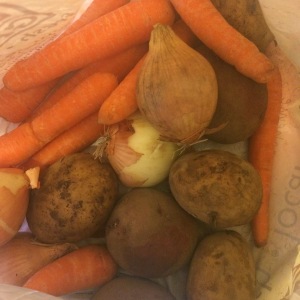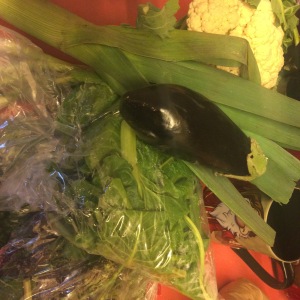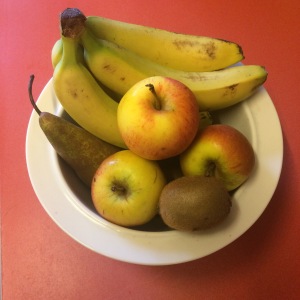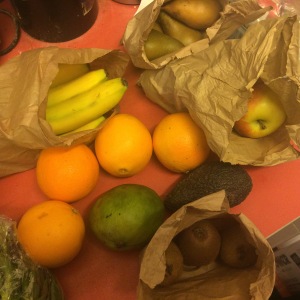My teenage daughter is looking suspiciously at the fruit bowl. I blame myself for this.
It’s not that she doesn’t eat fruit. It’s that the fruit she’s used to is generally supermarket bought; uniform, highly-shined fruit, available all year whatever the weather.
A couple of years ago I read Swallow This: Serving Up The Food Industry’s Darkest Secrets, by Joanna Blythman* and learned about some of the processes that happen to supermarket fruit to keep it shiny and fresh looking. I was horrified. I thought I was feeding my kids healthy fresh fruit, but it turns out its covered in chemicals the shops don’t need to declare because what they’re doing to the fruit counts as a process not an ingredient.
There seems to be so much to worry about when buying food anyway, excess packaging, food waste, air miles, palm oil, E numbers, fats, sugar, carbohydrates, cholesterol… It’s all too much to take in – so I just filed the information away in my brain and kept buying the fruit. Because some fruit is better than none, and they wouldn’t be allowed to use anything dangerous, would they?
I’m currently reading Unprocessed: My City Dwelling Year of Reclaiming Real Food, by Megan Kimble* and it’s got me thinking about the issue of processed food all over again. In trying to get healthier for the Newcastle Can challenge I’ve been trying to cook more meals from scratch, less take always, less frozen chips, more fruit and veg. But if the fruit and veg I’m buying from the supermarket has already been sprayed with pesticides, shined with wax, and coated with chemicals to make it last longer is it still healthy?
I don’t think I could completely avoid processed foods but I would like to avoid more of them. I think there’s a connection between the increase in obesity and the rise in power of the food industry. I’m no dietician or nutritionalist, I’m just a very confused ordinary person who wants to do better. But where do I start?
In the introduction to Unprocessed Megan Kimble describes how a simple suggestion made her see things in a totally different way: “Spend money better.” Her example uses American dollars, but I imagine it would be similar in the UK.
“If a community the size of Tuscon shifted 10 percent of its spending to local businesses – a 10 percent shift, not an increase – within one year, we would create almost $140 million revenue for the city. What this also means, I realise, is that we would withhold that $140 million from the balance sheets of those corporations that then use our money to influence government policy, to grow unsustainable food, to waste energy – and to process and sell us foods that aren’t good for us.
This came as a revelation to me too. I mean, I knew buying local was a good thing. I try to support small local businesses rather than big chains when I’m treating myself to cake and coffee, going out for a meal or buying gifts, but it had never occurred to me to do the same for my food shopping. The supermarket is just where you buy your food, it has been all my life (although, at the risk of sounding like a grumpy old woman, the supermarkets when I was little were very different from the massive 24 hour stores I’m used to now).
For a while in the late 90s/early 00s I got organic veg delivered. But my budget was tight and organic food started being available much more commonly in the supermarkets, so I stopped. As money got tighter I started only buying organic for the things we eat raw, and gradually only buying organic if it was reduced to clear.
I like to think of myself as frugal rather than penny-pinching, careful rather than tight-fisted. I like a bargain, who doesn’t? As prices have been going up much faster than wages for quite a while I need to watch what I spend, as do most people.
But I want to put my money where my mouth is. I don’t want to just whinge and worry about processed food, excess packaging, sustainability, air miles and the rest. I want to do something. And I think it would be great if as well as bringing the city together to get healthier the Newcastle Can project boosted the local economy!
So I’ve signed up to a trial weekly fruit and veg scheme from North East Organic Growers. It felt really expensive, but then I’ve never paid for a full months worth of fruit and veg in one go before. And given what I’m saving on take-aways since signing up to Newcastle Can I have some spare cash.
Every week my fruit and veg is delivered to a local contact person and I collect it from there. I don’t know what I’ll be getting in advance, it’s like a lucky dip and the kids are always keen to help unpack to see what’s there. There will always be staples like onions, potatoes, carrots, apples etc. but there are other things too, things I wouldn’t necessarily pick up if I was food shopping. For example purple sprouting broccoli is something I’d heard of but never cooked with, so it’s challenging me to cook new recipes and try new things.


So, my teenage daughter is looking suspiciously at the fruit bowl. I blame myself for this. But I’m working on putting it right.
“Those apples look weird.”
“What’s wrong with them?”
They’re not very shiny. And that one’s got speckles.”
“That’s what apples look like! Just try one.”
She liked it.
– – – – –
* Click here for an extract from Swallow This: Serving Up The Food Industry’s Darkest Secrets, by Joanna Blythman
* Click here to find out more about Unprocessed, by Megan Kimble.


2 thoughts on “That’s what apples look like! #NewcastleCan”